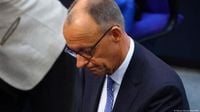In a surprising turn of events, Friedrich Merz, the leader of Germany's Christian Democratic Union (CDU), failed to secure the necessary votes to become the country's next Chancellor during the first round of voting held on Tuesday morning, May 6, 2025. Merz, who was widely expected to win after successful coalition negotiations with the Social Democrats (SPD), garnered only 310 votes from the 621 cast, falling short of the required 316 votes for an absolute majority.
This unprecedented outcome marks the first time in post-war German history that a designated chancellor has failed to obtain a parliamentary majority after coalition talks. The result has sent shockwaves through the political landscape, with immediate calls for Merz to step aside from various political factions, including the far-right Alternative for Germany (AfD).
Merz's failure to secure the chancellorship is particularly striking given the backdrop of a coalition that was believed to have a comfortable majority in the Bundestag. The CDU/CSU and SPD coalition holds 328 seats in total, yet at least 18 members from these parties did not support Merz in the vote. This raises questions about the stability of the coalition and Merz's leadership.
Following the vote, Merz retreated to his office for discussions with key allies, including Jens Spahn, the CDU-CSU parliamentary group leader, and other prominent figures within his party. The mood was somber as they contemplated the implications of the failed vote. Spahn noted that the situation was unexpected and emphasized the need for a swift resolution.
Meanwhile, the Left Party has expressed a desire for a second round of voting to take place as early as Wednesday, May 7, 2025, to avoid any delays that could disrupt their own party conference scheduled for Friday. Bodo Ramelow, a member of the Left Party, criticized the coalition partners for not securing the necessary votes, stating, "I'm pretty angry, to put it bluntly. This shouldn't have happened."
The political ramifications of Merz's defeat extend beyond the Bundestag. The DAX stock market index reacted negatively to the news, dropping 1.1% shortly after the election, reflecting investor concerns over political instability in Germany. Analysts had viewed Merz's proposed investment plans in defense and infrastructure as potential catalysts for economic growth, making the failed election a significant setback.
In the wake of the voting, the SPD has distanced itself from the blame for Merz's failure, asserting that all its members were present and accounted for during the vote. SPD co-leader Lars Klingbeil stated, "The 85% members' vote is a mandate for the parliamentary party and it fulfilled this. We are reliable."
Conversely, the AfD welcomed Merz's defeat, with party leader Alice Weidel calling for fresh elections. She criticized the coalition as fragile and suggested that Merz should step aside to allow for a new election process. Weidel's sentiments echoed a broader frustration among opposition parties regarding the coalition's perceived weaknesses.
As the dust settles from this historic vote, questions loom over what comes next for Merz and the coalition. Under German law, since he failed to secure an absolute majority in the first round, a second round of voting is mandated within 14 days. If this second round also fails to produce a result, the election process will enter a third phase, potentially leading to new elections.
In the context of this political turmoil, Richard Walker, DW's chief international correspondent, highlighted the challenges Merz faces moving forward. "No matter what happens now, it appears quite impossible to forget about Tuesday's failed vote domestically," he said. "But the picture on the world stage is yet another story since people are keen on seeing whether Merz, assuming he takes office, can quickly produce results."
The Green Party also weighed in on the situation, with co-leader Franziska Brantner expressing disappointment over the outcome. She emphasized the need for a government capable of taking decisive action for both Germany and Europe, stating, "They now have to prove that they can do this now, but also for four years."
As discussions continue among coalition members about the next steps, the political landscape in Germany remains uncertain. The failure of Merz to secure the chancellorship raises fundamental questions about his leadership and the coalition's ability to govern effectively amidst rising political tensions.
In conclusion, Friedrich Merz's failed election as Chancellor not only marks a significant moment in German political history but also sets the stage for potential upheaval in the coming weeks. With competing interests at play and a divided parliament, the path forward is anything but clear.







